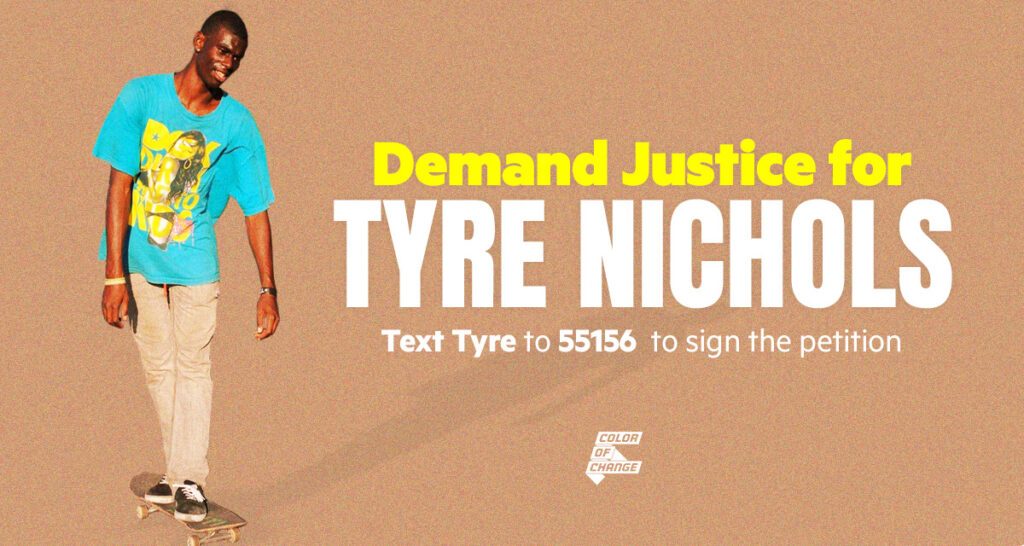COC calls for police reforms after Memphis police kill Tyre Nichols

By Color Of Change staff
Days after burying their son, the parents of Tyre Nichols, the 29-year-old Black man who died after a savage beating from Memphis police, sat in the U.S. Capitol gallery during President Joe Biden’s State of the Union speech last week.
In his speech, Biden mentioned a conversation he had earlier with RowVaughn Wells, noting she said her son “was a beautiful soul” and urged the president to make “something good” out of his tragic death.
But Color Of Change President Rashad Robinson doesn’t see Biden — or a bitterly divided Congress — making Wells’ wish come true any time soon.
“What we heard was in some ways exactly what we expect from President Biden at this point,” Color Of Change President Rashad Robinson told NPR a few days after the address. “I think the challenge is we are in a divided government. So this is not about listing off a set of policies that you hope Congress will pass. This is about actually having a conversation with the American people about power and safety.”
Substantive reform, Robinson said, has to happen at the local and national levels — and communities must have a place at the table.
“We think that there’s just far too much interaction that is funded between law enforcement and the community that does not lead to solving any crimes or our communities being more safe,” he said. “The thing, though, about presidential executive orders is the vast majority of the issues that we are facing are happening at the local level.”
That power imbalance is addressed in “A New Vision for Community Safety,” a Color Of Change report outlining ways to help prevent police use-of-force killings by improving conditions in the communities they are sworn to serve.
Issued in September 2022 with the Brookings Valuing Black Assets Initiative, the Brookings Bass Center for Transformative Placemaking, the Civil Rights Corps and the Vera Institute of Justice, the report recommends ways to make neighborhoods safer, reducing the need for heavy-handed police. It calls for investing in community green spaces, developing sports or activity programs for underserved youth and funding grassroots organizations that address fundamental issues — housing, child care and poverty — that foster crime.
To keep people “truly” safe from violence and harm, “policymakers must tackle the ‘social determinants of safety’ that contribute to neighborhood violence,” the report states. “Just as in public health, where prevention is the most effective way to keep people healthy, preventative safety is the most effective way to keep individuals, families and communities safe.”
Indeed, Nichols’ death in early January is linked to city officials’ attempts to reduce crime.
After several Memphis police officers stopped Nichols’ car for an undetermined reason, they yanked him out, sprayed him with mace and shocked him with a Taser. Nichols broke free and ran, but when police caught him minutes later, they punched, kicked and beat him with a metal baton. He died in a hospital three days later on Jan. 10.
The officers who attacked him were part of SCORPION, a special Memphis police unit created to address residents’ complaints about gun violence, including record-high homicide rates. The now-disbanded unit’s acronym stood for Street Crimes Operation to Restore Peace in Our Neighborhoods.
Color Of Change’s New Vision for Community Safety is designed to eliminate the need for such aggressive tactics by investing in communities that have been ignored for generations. Healthy, thriving people and neighborhoods, the report says, make for safer communities.
“All people deserve safety in their homes, workplaces, parks and other community spaces — safety not only from violence, but from the economic, social and environmental conditions that fuel violence in the first place,” according to the report.
“Within the United States, however, access to physical safety — just like access to clean air, economic mobility and high-quality schools — is shaped by where someone lives, with our most unsafe places reflecting decades of systemic disinvestment,” the report states.
Robinson said lawmakers on the right, under the influence of police unions, police foundations and the corporations that fund them, have stymied progress on Capitol Hill. But activists are making progress locally by helping elect reform-minded district attorneys and pressuring civic leaders to change police strategies on traffic stops and mental health-related calls.
Still, “The thing here that’s important is that our civil rights can’t just be a patchwork,” Robinson said. “They just can’t shift when we move from one community to another, from one state to another. And that is the important role that the federal government has here.”
Read a summary of the report’s recommendations here. Join COC members in signing a petition urging the Memphis City Council take action to prevent police abuse.

